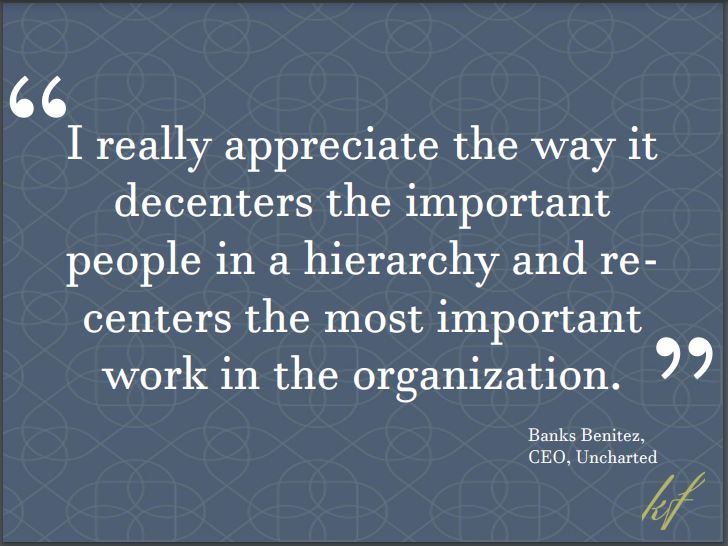Which Do You Value More: Important Work or Hierarchy?
June 21, 2022

"I really appreciate the way it decenters the important people in a hierarchy and re-centers the most important work in the organization."
I love this quote.
It's from a conversation between Greg McKeown (author of Essentialism: The Disciplined Pursuit of Less) and Banks Benitez (CEO, Uncharted) on McKeown's podcast.
The interview is about Benitez's journey taking his company from a 5-day workweek to a 4-day workweek. He and his leadership team drew heavily on many of the concepts in McKeown's book Essentialism to make this transition a reality and a success.
Benitez's commitment to his team at the outset of this 4-day workweek experiment was that they would try it for a period of three months, and they would maintain 100% productivity and contribution, and continue to receive 100% pay. They would accomplish this through one of the core tenets of Essentialism: Trade-offs.
Trade-offs are simply this - a choice between two things we want, or between things we need to do. Put another way, for everything we say yes to, we are saying no to something else. When we say yes to Netflix and the couch, we are saying no to going for a walk. When we say yes to our child's Saturday morning practice, we are saying no to sleeping in. When we say yes to attending a meeting, we are saying no to working on the deliverable that's due the next day.
We don't often consciously think about the many trade-offs we make in a day, especially in the workplace. And we don't often think about what is truly most important for us to be doing and working on; as opposed to believing that everything is of equal importance, or spending our limited time on other people's priorities.
"Many capable people are kept from getting to the next level of contribution because they can't let go of the belief that everything is important." (McKeown, Essentialism)
Among the many take-aways from Banks’ and McKeown’s conversation, there are two that really stand out for me. The first is very practical in nature, but the second….well, it would be a major cultural shift for many organizations.
#1: Trade-Offs Trump Efficiency
Benitez knew his company would not be able to reduce their time by 20% by looking for efficiencies. At best, he knew this would help them find a 3, 4 or maybe even 5% gain - but not 20%. To get to 20% was going to require a true prioritizing of some things, along with a deprioritizing of others. In other words, determining what was truly essential and then making the necessary trade-offs.
This would require at least three critical supports:
- A commitment to regular and ongoing conversations to clarify the most important work Uncharted needed to do to succeed, and how to prioritize that work.
- A commitment to regular and ongoing conversations about the work they would not do – they work they would say no to or deprioritize.
- Developing new habits to keep all of this alive. New habits around meetings; new habits around more disciplined collaboration; and new habits around how to say 'no' to a request from a colleague (not to mention, how to hear that 'no').
#2: Trade-Offs and Hierarchy
The second, and even more impactful comment Benitez shared, occurred much later in the conversation. This is where he makes a connection between hierarchy and trade-offs. In his own words…
"…when done well, principles of essentialism decenter the individual who’s in power, and re-center the priorities in power. And that I think is powerful, it’s exciting, because it doesn’t mean that because somebody holds a title, that they are the most important and what they say goes. Actually, it democratizes the awareness that we’re a team working toward goals and that we have to be thoughtful and judicious about how we spend our time on the most essential work. And so, I really appreciate the way it decenters the important people in a hierarchy and re-centers the most important work in the organization."
Again, I just love this. It's not the central concept in this discussion, but I think it's an incredibly important one that everything else actually hinges on.
While hierarchy plays an important role in most organizations, it can also wreak havoc if we aren't careful. And Benitez provides some good examples of this. Placing organizational priorities and our most important work in a position of power is a major mindset shift. Actually, it’s a major culture shift too.
To truly live this means that a person 'lower' on the org chart could - and perhaps should - question a request from someone 'higher' in the organization, if that request takes the person away from important work they are currently focused on. It means that a conversation would need to take place about which work is most important for that person to spend their time on. They would not default to an automatic 'yes' simply due to the other person's level or status within the hierarchy of the company. And most importantly, it would require permission. The permission to pause, to ask questions, and maybe even to say ‘no’ or ‘not right now’. The ability to institute a culture such as this really does place the most important work at the centre, as opposed to the most important people.
Important work over hierarchy - a mindset shift, indeed!
There are so many other valuable and interesting nuggets in this conversation. Here's a link to the full interview. Enjoy!